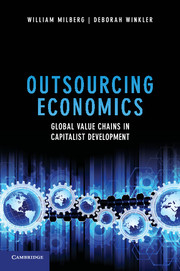Book contents
- Frontmatter
- Contents
- List of Figures
- List of Tables
- List of Appendices
- List of Variables
- List of Abbreviations
- Acknowledgments
- 1 Introduction
- 2 The New Wave of Globalization
- 3 What Role for Comparative Advantage?
- 4 Lead Firm Strategy and Global Value Chain Structure
- 5 Economic Insecurity in the New Wave of Globalization
- 6 Financialization and the Dynamics of Offshoring
- 7 Economic Development as Industrial Upgrading in Global Value Chains
- 8 Outsourcing Economics
- References
- Index
1 - Introduction
Published online by Cambridge University Press: 05 April 2013
- Frontmatter
- Contents
- List of Figures
- List of Tables
- List of Appendices
- List of Variables
- List of Abbreviations
- Acknowledgments
- 1 Introduction
- 2 The New Wave of Globalization
- 3 What Role for Comparative Advantage?
- 4 Lead Firm Strategy and Global Value Chain Structure
- 5 Economic Insecurity in the New Wave of Globalization
- 6 Financialization and the Dynamics of Offshoring
- 7 Economic Development as Industrial Upgrading in Global Value Chains
- 8 Outsourcing Economics
- References
- Index
Summary
The Public Debate versus the Economics Profession
“Ricardo Is Still Right…”
In his bestselling account of globalization, The World is Flat, Thomas Friedman (2005) describes standing in Bangalore one morning in front of the gates of the Infosys Corporation – a major Indian provider of software and office services to U.S. corporations – and watching as young employees stream in to work. “Oh my God,” he thinks to himself,
There are so many of them, and they all look so serious, so eager for work…How in the world can it possibly be good for my daughters and millions of other young Americans that these Indians can do the same jobs as they can for a fraction of the wages? I struggled over what to make of this scene. I don't want to see any American lose his or her job to foreign competition (Friedman 2005, 226).
Yes, Friedman is concerned about the future of the American workforce, but he is also grappling with his faith in Ricardo's principle of comparative advantage, a harmonious view of globalization in which all countries can gain from trade liberalization. The sight of so many energetic young Indians, “all looking as if they had scored 1,600 on their SATs,” is alarming because it would seem that the success of Infosys can only mean fewer jobs for their American counterparts, including Friedman's daughters (Friedman 2005, 225). But if Friedman is a true Ricardian, he can calmly consider the bustling activity of Infosys without worrying that it bodes ill for American enterprise.
- Type
- Chapter
- Information
- Outsourcing EconomicsGlobal Value Chains in Capitalist Development, pp. 1 - 32Publisher: Cambridge University PressPrint publication year: 2013



